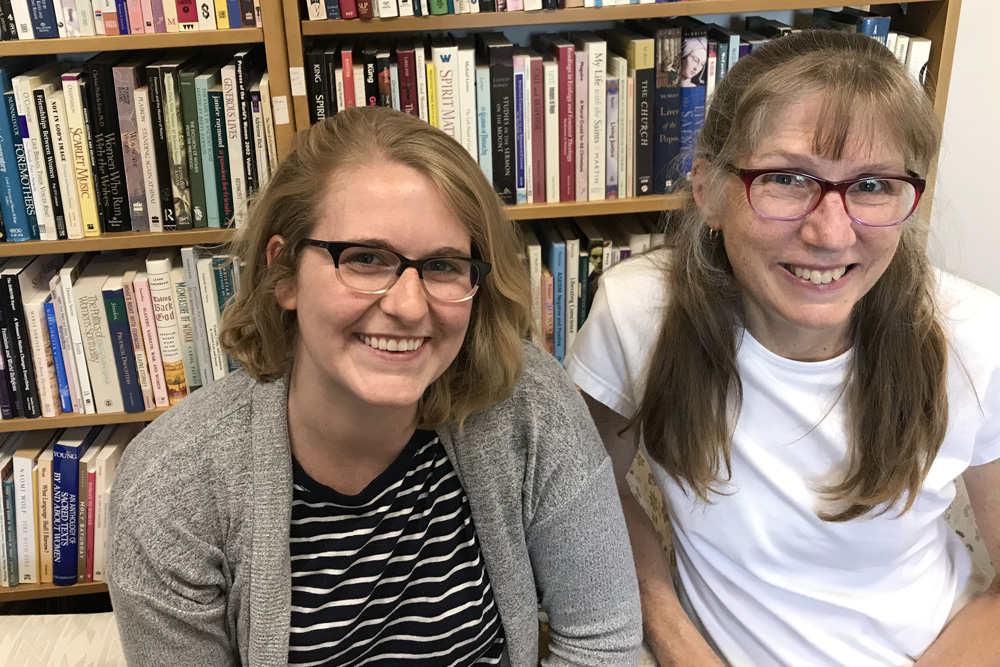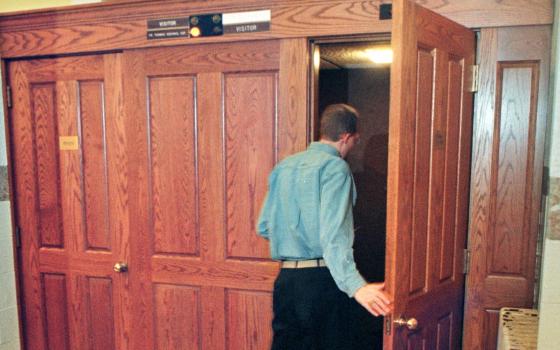A weekslong e-course on community showed Katie Gordon, 28, that a hunger for authentic community transcended her millennial peers, affecting a spectrum of generations.
An online movement from the Benedictine Sisters of Erie, Pennsylvania, Monasteries of the Heart, launched in 2011 to share Benedictine spirituality with contemporary seekers. Newsletters, weekly formation courses, daily spiritual practices and e-courses are all part of the membership.
Gordon spent this summer as an intern for author and Benedictine Sr. Joan Chittister. In 2017, Gordon founded a Michigan branch of Nuns and Nones, where spiritually curious millennials gather with sisters to talk about spirituality, social justice and community.
For three weeks in July, the e-course with 165 members from around the world explored "community," with Gordon and Benedictine Sr. Linda Romey leading discussions twice a week, offering readings and reflection prompts. Each Friday, members joined a group discussion through video chats via Zoom, an online conferencing service.
"The conversations that we've been having in the e-course connect back to the conversations Linda and I had when we first met a year and a half ago, where she was writing for GSR on emerging trends in religious life and I was studying spiritual innovation and community [at Harvard Divinity School]," Gordon said.
"We've been asking similar questions coming from different perspectives, so this e-course seemed like a perfect opportunity for us to come together and weave our experiences together in an interesting conversation."
Global Sisters Report talked to Gordon and Romey about their reflections after leading the e-course and what they learned from their online community.
GSR: Tell me about the research process, pulling from readings and gathering inspiration for discussion questions. What did you learn in your research?
Romey: As a member of the Benedictine community, it's a topic I think about a lot. [I was drawing inspiration from] Terrence Kardong's Benedict's Rule and another book, Monasticism in the 21st Century, a compilation of essays from prominent Benedictine writers on monasticism moving forward, as well as the daily experiences in community. Sometimes that's easier to live and other times it's not, but it's a reminder that we're doing this together, and ideally, everyone is seeking God in community, even in our worst days. That provides good reflection.
Gordon: My inspiration for the questions that we posed each week came more from experiences, rather than research. I was able to bring experiences and insights from working largely with the millennial generation in regards to religion, spirituality and community, and applying that into this e-course.
Hearing how people responded to what I was sharing was really revealing, how the hunger for community exists across generations and is not something millennials are uniquely reinventing today. That led to one of my biggest takeaways from the e-course, that there is loneliness and a seeking-out of deeper community and connection of all people today. Coming together across those generations in order to create community is uniquely possible in these online contexts.
Romey: And for some people, it's their primary source of contact; we had a couple who are homebound because of where they are or their physical limitations. These online connections become a sort of lifeline for some people. I'm grateful that the opportunity is there for those who don't have what I do in terms of physical community.
What concepts or prompts were you most eager to bring to the group?
Romey: Trying to respond to the concerns that the participants had and also bringing in the monastic tradition. That was part of our purpose in founding Monasteries of the Heart, to share the Benedictine tradition, and community is one piece of that. It's one thing to live it as I do 24/7, and it's another to be by yourself, and your community is your book club, your parish group. That was interesting for me to talk about, to help people see that community is defined in multiple ways and at multiple levels, and it's not always easy to pinpoint.
Gordon: In Nuns and Nones, when we speak of community, we speak of it as being for something outside of ourselves, as many do, so I was excited to ask people: What is community for beyond nourishment? How can communities contribute to responding to the challenges of our time? I was really excited to see how people were thinking about not just building community, but creating community for a greater cause and for responding to the needs of the time.

Katie Gordon, left, and Sr. Linda Romey (Provided photo)
How did you draw from your Nuns and Nones experience?
Gordon: The spirit of this e-course is perfectly aligned with what Nuns and Nones is all about, which is learning about community from one another and seeking out wisdom of a community for today. Everything that I was able to contribute to the course was coming out of my experience with Nuns and Nones. We had more millennials than previously on this call [coming from the Nuns and Nones contact list] that were able to have a good exchange with people, and it's something that Nuns and Nones is learning from, too.
Romey: Nuns and Nones was where the idea to do the Zoom calls in the e-course came from, because Monasteries of the Heart have been doing e-courses for seven or eight years now, but we have never done a Zoom call gathering before. Some had been members [of Monasteries of the Heart] for years, and it made a difference in the interaction. I'm grateful Nuns and Nones gave me a new vision for how to use software that isn't native to me as a 60-year-old.
What were comments/exchanges that stayed with you and made you think or threads that inspired particularly rich conversations?
Gordon: One theme came up a few times: how different types of communities can meet different needs you have, and there isn't only one way of building community or how community looks. What stuck with me was the variety of communities that people brought with them.
Romey: The thing that struck me was acknowledging that I am accountable to my communities and responsible for my community, that "true community" isn't a free ride for anyone. That said, there always needs to be room for those who have more difficult challenges or struggle more in relationship so the community is big enough to absorb some of that. But for the most part, if I'm a member of the community, I need to be accountable to those sharing the space with me and be responsible for them, and I have a right to expect the same from most of the community. Together, we carry those who aren't able to be fully accountable or responsible, and I really felt like that was something people were acknowledging, that to make it work, it takes all of us working together.
How did this program personally enrich you?
Romey: One of our Benedictine vows is conversion, conversion of life; it's a constant reminder that we're always on the way. In this interaction, every time I read other people's comments or what Katie posted, it made me stop and look at myself and say, "Am I being my best self in my communities? Where can I be more attentive to not just my immediate community, but also the world community?"
That's our Christian call, as we say in the monastery: We fall and get up, we fall and get up. So being with these people for three weeks was a getting up and learning from them, knowing that I'm here doing my little part to be a better member of our community, and I draw strength from knowing that there are 160 other people around the world doing the same as I am. It gives me lots of hope.
Gordon: Another vow that Benedictines take is the vow of stability, and I think that's what I've been reflecting on most over the last few weeks this summer here in Erie: the importance of commitment and the richness that can come out of being stable in one place and to one group of people.
For me, reflecting on the questions of community have often been abstract, sort of philosophically reflecting on what community is. And this summer, being able to be more immersed in the questions while also living in community has helped me ask really important questions to myself — like, who am I committing myself to, where can I find a sense of stability in community, and what does that look like in my own life moving forward? This learning community through the e-course has helped spark many questions for me in what community can look like in my day-to-day life.
[Soli Salgado is a staff writer for Global Sisters Report. Her email address is [email protected]. Follow her on Twitter: @soli_salgado.]
Editor's note: Benedictine Sr. Linda Romey is a regular contributor to Global Sisters Report. You can read her work on GSR here.
Advertisement




